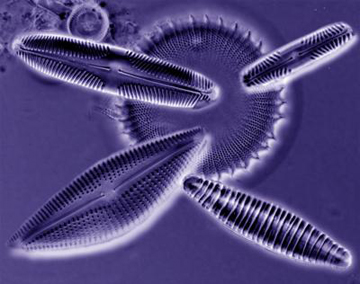New study shows how greater biodiversity more efficiently scrubs pollutants from freshwater.
A new landmark study not only proves that adding more species to a freshwater stream linearly increases the ecosystem’s ability to clean pollutants, but also shows why. The study, published in Nature found that by increasing the biodiversity of a lab controlled mini-stream from one algae species to eight caused the ecosystem to soak up nitrate pollution 4.5 times faster on average.
To conduct the experiment, researchers used plastic to create 150 mini model streams. Molding the plastic, they recreated real stream-like habitats such as pools, runs, and eddies. Different species of algae gravitated toward particular mini-habitats, creating special ecological niches and allowing more of the stream to be utilized by the algae for soaking up the nitrate pollution. Less utilization of the available habitats resulted in a dirtier river and vice-versa.
“As the different habitats in a stream are filled by diverse populations of algae, the stream receives more total biofiltration,” explains lead author Bradley Cardinale with the University of Michigan. “It’s as if the algae work as a better sponge.”
 Algae similar to those used in the study. Photo by: Danuta Bennett. |
The study provides a breakthrough in uncovering the exact processes by which higher biodiversity results in a more efficient and richer ecosystem. The key, according to Cardinale, is the utilization of various niches across a complicated ecosystem.
“People as far back as Darwin have argued that species should have unique niches and, as a result, we should see a division of labor in the environment. But demonstrating that directly has proven very difficult. And so one of the primary contributions of this study is that I was able to nail the mechanism and show exactly why streams that have more species are better at removing these nutrient pollutants from the water.”
Nitrate is a nutrient-rich pollutant that commonly enters freshwater habitats from fertilizers used in agriculture and sewage.
Practically conservation of freshwater biodiversity could enhance water quality, says Cardinale. For example, preserving streams that feed freshwater areas of concern, such as the Chesapeake Bay watershed and the Great Lakes in the US, would help recover water health.
While the study provides good news as to another reason why biodiversity matters, it also points to a bleaker conclusion. Cardinale says the “loss of biodiversity through species extinctions could be compromising the ability of the planet to clean up after us.” He adds that his study is “part of a growing body of scientific evidence […] that the modern mass extinction of species is going to affect humanity in some big, and important ways.”
Concernedly, freshwater species appear even more at risk than their land or oceanic counterparts. A study in 2009 found that freshwater species are likely the most threatened on earth with extinction rates four to six times higher than the rates for terrestrial and marine species.
“If we were to maintain streams in their naturally diverse state, these streams that we love for their recreation, for their beauty, for fishing, etc. … have the tangential benefit of cleaning up our water for us,” Cardinale told Reuters, adding that, “if we let nature do its thing, we don’t have to run around creating very expensive water treatment plants all over the planet.”
Related articles
Rich plant diversity leads to increased productivity, ecosystem services
(03/08/2011) A new study finds that diversity of plant species matters—big time. Analyzing nearly 600 research studies, the meta-study in the American Journal of Botany found that productivity in biodiverse plant ecosystems was 1.5 times higher than in monocultures. In other words, a prairie is more productive than a cornfield and forest more productive than a rubber plantation. The researchers warn that eroding plant diversity threatens essential ecosystems services such as food, water purification, oxygen production, carbon sequestration, and the availability of raw materials.
World’s sixth mass extinction still preventable
 (03/03/2011) So, here’s the good news: a mass extinction, the world’s sixth, is still preventable. But the bad news: if species currently threatened with extinction vanish—even over the next thousand years—homo-sapiens will be the first single species responsible for a mass extinction. Comparing today’s current extinction crisis with the big five that occurred in the past, a new study in Nature finds that while the situation is dire, the choice is ultimately up to humanity. “If you look only at the critically endangered mammals—those where the risk of extinction is at least 50 percent within three of their generations—and assume that their time will run out, and they will be extinct in 1,000 years, that puts us clearly outside any range of normal, and tells us that we are moving into the mass extinction realm,” explains lead author Anthony D. Barnosky, UC Berkeley professor of integrative biology.
(03/03/2011) So, here’s the good news: a mass extinction, the world’s sixth, is still preventable. But the bad news: if species currently threatened with extinction vanish—even over the next thousand years—homo-sapiens will be the first single species responsible for a mass extinction. Comparing today’s current extinction crisis with the big five that occurred in the past, a new study in Nature finds that while the situation is dire, the choice is ultimately up to humanity. “If you look only at the critically endangered mammals—those where the risk of extinction is at least 50 percent within three of their generations—and assume that their time will run out, and they will be extinct in 1,000 years, that puts us clearly outside any range of normal, and tells us that we are moving into the mass extinction realm,” explains lead author Anthony D. Barnosky, UC Berkeley professor of integrative biology.
Will biodiversity agreement save life on Earth?
 (11/07/2010) On Friday, October 29th, 193 member nations of the Convention on Biological Diversity (CBD) reached a possibly landmark agreement on saving the world’s suffering biodiversity in Nagoya, Japan. The agreement was especially notable after nations failed—by all accounts—to live up to the goals from the previous CBD agreement, including stemming the global loss of biodiversity by 2010. According to scientists, the world’s species continue to vanish at mass-extinction rates due to habitat loss, deforestation, overconsumption, pollution, climate change, and invasive species. To addresses this crisis the new CBD agreement sets out 20 goals for 2020. But given the global challenges in saving the world’s species and the lack-of-teeth in agreement (it is strictly voluntary), will the CBD make a difference or in ten years time will goals be again unmet and life on planet Earth worse off than ever? To answer this mongabay.com turned to a number of experts in the conservation world.
(11/07/2010) On Friday, October 29th, 193 member nations of the Convention on Biological Diversity (CBD) reached a possibly landmark agreement on saving the world’s suffering biodiversity in Nagoya, Japan. The agreement was especially notable after nations failed—by all accounts—to live up to the goals from the previous CBD agreement, including stemming the global loss of biodiversity by 2010. According to scientists, the world’s species continue to vanish at mass-extinction rates due to habitat loss, deforestation, overconsumption, pollution, climate change, and invasive species. To addresses this crisis the new CBD agreement sets out 20 goals for 2020. But given the global challenges in saving the world’s species and the lack-of-teeth in agreement (it is strictly voluntary), will the CBD make a difference or in ten years time will goals be again unmet and life on planet Earth worse off than ever? To answer this mongabay.com turned to a number of experts in the conservation world.